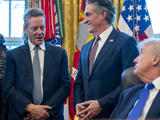North Korea Condemns G7 Discussion: Raising the Nuclear Stakes
Xinhua and People's Daily both carried reports on North Korea's condemnation of a G7 meeting discussion focused on North Korea's nuclear capabilities. Both stories emphasize North Korea's statement that it will bolster its nuclear arsenal in response to what it perceives as external nuclear threats. The rhetoric suggests the G7's nuclear discussions are mechanisms of control and aggression, framing nuclear arms as a defensive necessity for North Korea.
Both publications highlight a common narrative: the G7 is depicted as the initiator of international nuclear tensions, unjustly wielding the threat of force against sovereign nations. This presents the unlikely scenario of North Korea as a responsibility-laden guardian against nuclear escalation rather than an aggressor. From the perspective of the Chinese media, aligning with North Korea’s stance reiterates a longstanding narrative around anti-Western dominance, hearkening back to Cold War-era polarization.
Globally, this narrative carries significant implications. First, it deepens the divide in international dialogues around nuclear disarmament by perpetuating mistrust between nuclear and non-nuclear states. It challenges efforts toward genuine non-proliferation, potentially paving the way for other states to cite ‘defensive’ nuclear buildups. Second, strategically, it positions North Korea as a willing participant in what it labels defensive escalation, which risks encouraging similar posturing from other regional actors.
As countries grapple with realigning global power structures, North Korea's stance, backed by sympathetic media portrayals, complicates international relations, particularly in Asia. Maintaining regional stability henceforth will require navigating this hardening of positions, where diplomatic engagement and containment strategies might clash with rising sovereignty debates amid a heavily militarized status quo.


